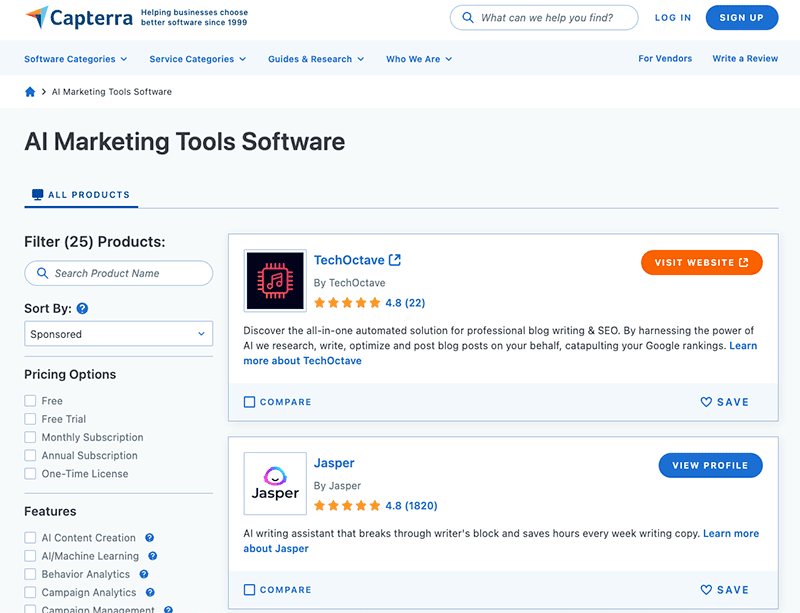The year is 1750. The slow creak of wagon wheels and clinking bottles of potion heralds the arrival of the snake oil salesman, poised to strike at anyone who falls for his quackery. Fraud may look a little different in 2023, but some things never change — where there’s a market, there will always be grifters.
If you’re embarking on a journey to find the right AI software to help you execute digital marketing campaigns, beware of modern-day scammers who insist their product uses the most advanced artificial intelligence. It almost never does.
What Is AI Washing?
Despite the name, AI washing has nothing to do with taking a high-tech shower or cleaning a robot.
Much like the term “greenwashing,” which is when a company makes fraudulent claims about its sustainability practices, a business that employs AI washing oversells its product’s true capabilities. In other words, the business claims its product uses artificial intelligence when it doesn’t, or it exaggerates how powerful the AI system really is. Why?
To put it simply, it’s just not as easy to sell a traditional product these days. People want bells and whistles. They want the latest tech. And, frankly, the fact that some software bears the proud “AI” moniker implies that other software is less than capable. Given the choice between a system that learns and grows versus one that sits there inert, which would you choose?
But creating real AI software is tricky. It often requires trained professionals to collaborate over long periods of time, pooling their resources to create a product that actually works. Few people have the expertise or funding for that.
It’s a tale as old as time, but some vendors fall back on a tried-and-true method for making sales — telling people what they want to hear. Some AI-washing businesses intend to use AI in the future but haven’t quite met their goals yet. Other companies might truly be misguided and think they’re using AI when they aren’t, applying the label to any technology they deem more advanced than usual.
Whatever the reason, businesses using AI washing pose a threat to legitimate AI providers and consumers who want AI tech. The practice could turn “AI” into little more than a marketing buzzword like “superfood” or “all natural,” neither of which mean anything when it comes to actual farming. If consumers become desensitized to the term, real artificial intelligence companies will have a harder time promoting their services. That could hinder future AI development.
How to Spot and Avoid AI Washing in Marketing Campaigns
Don’t get swindled. Marketing is challenging enough as it is, with 92% of employers using social media campaigns to reach out to potential job candidates. In 2023 alone, businesses are projected to spend over $700 billion on digital advertising. It’s no wonder so many marketers want a little help from AI.
But AI washing can waste your company’s time and money. If you’re looking for legitimate AI tools to aid in your marketing efforts, here’s how to protect your business against scammers selling phony software:
1. Check The Company’s Ratings
The business likely features glowing reviews on its own website, but that’s not a reliable source. Use a search engine to look for more nuanced evaluations so you can form your own opinion. Specifically, look for reviews from other businesses that have used the product for a while. Platforms like Capterra and G2 Crowd often have the most updated ratings from real customers.
Screenshot: Capterra – AI Marketing Tools
Can’t find any reviews? It could be a brand-new company, but in general, that’s not a good sign.
2. Dig Deeper
How old is the business? Can you find any evidence that it utilizes AI software? Read the “About Us” section on the company’s website to start learning about its history, then double-check the claims against a broader online search.
3. Be Wary
Your gut might be telling you that something is a little off. Maybe the software is surprisingly inexpensive or the company claims it has the best AI-powered software on the market. Maybe the company even reached out to you specifically, phishing-style, to promote its extremely advanced software to “cutting-edge businesses like yours.”
To clarify, there’s no such thing as self-aware artificial intelligence, AI that possesses theory of mind or software that can completely replace an entire team of trained marketers. Such claims should raise a few red flags.
4. Ask Questions
A real company representative would probably be happy to answer your inquiries about how their artificial intelligence works, what the AI program is called, and how it’s unique compared to other software. A business that’s AI native — meaning programmers created the AI first, then built the company around it — should be able to give you detailed replies about the company’s history.
In contrast, AI-washing swindlers might hit you with a word salad of industry jargon, hoping you don’t notice that “AI-capable workflow generator” means absolutely nothing.
Staying Ahead of Scams
AI washing may be the latest marketing ploy, but you don’t have to fall for it. Use common sense to evaluate people’s products and services before buying. Ask questions to get a thorough understanding of a company’s history, expertise, and legitimacy. And, above all, remember that some things are just too good to be true.
For more great tips, tricks, and how-to’s, subscribe to the DivvyHQ blog today!

